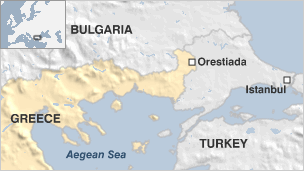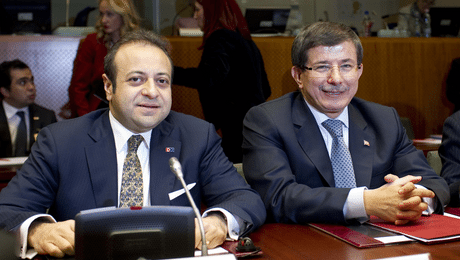Romance and “clandestine relationships” between ordinary Greeks and Turks is again the vehicle for another big-budget Turkish romantic comedy. The theme is far from uncommon in real life.
By Menekse Tokyay and HK Tzanis for Southeast European Times in Istanbul and Athens — 21/05/12
”]![MENEKSEHARRYphoto "Iki Yaka Bir Ismail" (Two Shores, One Ismail), the new Turkish romance series tackles the theme of mixed marriages. [ATV channel]](https://www.turkishnews.com/en/content/wp-content/uploads/2012/05/MENEKSEHARRYphoto.jpg) “Iki Yaka Bir Ismail” (Two Shores, One Ismail), the new Turkish romance series — shot on location on the eastern Aegean island of Lesvos (Mytilene) and in Aivali, across from the island in Turkey — was released earlier this month.
“Iki Yaka Bir Ismail” (Two Shores, One Ismail), the new Turkish romance series — shot on location on the eastern Aegean island of Lesvos (Mytilene) and in Aivali, across from the island in Turkey — was released earlier this month.
Playing on the theme of mixed marriage — this time between a Turkish fisherman and Greek island divorcee — it follows the wildly popular Turkish series “Yabanci Dama” (Foreign Groom), which debuted in 2004.
“For me, [mixed marriage] is no longer a taboo — I know of many Greeks now married to Turkish women, and quite a few Turkish men married to Greek wives. They live here in Mytilene, several in Aivali, in Larissa [in central Greece], everywhere,” according to actress Eleni Filini, one of the protagonists in the new series and a former beauty queen in the 1980s.
Take the real life couple of Aslihan Ozkara and Nikos Dimos, who met at a party a few years ago in Istanbul. In August 2008, the couple married in a surprise wedding held in the same Bosporus metropolis.
Ozkara told SETimes the fact that she and her husband hailed from different ethnic backgrounds meant nothing, as they are very similar as individuals.
Contrary to expectations, the marriage was well-received by their respective families.
“Probably because our families had lived abroad for a long time and were used to such mixed marriages, so it wasn’t perceived as something unusual,” she explained, adding that her husband’s family is also the product of a mixed marriage.
“So we, in a sense, continued a tradition. Nikos’ father was Greek and his mother Turkish. So, we didn’t see any weird reaction,” Ozkara said.
She added, however, that their marriage helped overcome certain latent and deeply rooted prejudices in their immediate social circles. “Through our marriage we tried to establish a bridge between these two cultures; to know each other and to understand each other in better ways,” she said.
Another successful “love story” from both sides of the Aegean is the Tsitselikis-Ozgunes family.
Meric Ozgunes and Constantinos Tsitselikis met at a Greek-Turkish civic dialogue workshop and currently live in the northern Greek city of Thessaloniki.
“Our respective nationalities definitely did not lead us to have a negative perception [of each other]. We were already involved in Turkish-Greek issues and open to dialogue; and a lot more than our nationalities united us. We were, in any case, against nationalism and cherished multi-culturalism,” Ozgunes told SETimes.
The couple was married during an official wedding ceremony in 2005, conducted in both Turkish and Greek, in Thessaloniki. As the parents of young children, they have neither baptised the children in the Orthodox Christian faith or ceremoniously circumcised them, as per the Muslim ritual.
“We will leave this decision to their will,” Ozgunes explained.
Asked about reactions towards the marriage, Tsitselikis said both families were very respectful of their decision, with the only queries coming from acquaintances or neighbours, who asked about the ubiquitous issue of religion.
“We had to face questions regarding what religion our children would have, if we were to have any,” he said.
Tsitselikis and Ozgunes said they believe the impact of such marriages can only be measured on their immediate social and professional circles.
“It definitely allowed some people around us, such as relatives and neighbours, to come into contact with the ‘other’, to put flesh and bone to a ‘Turk’ or a ‘Greek’, and therefore, it helped break certain stereotypes,” Ozgunes explained.
Ayse Gunduz Hosgor, an expert on mixed marriages from the Ankara-based Middle East Technical University, underlined that mixed marriages are a contributing factor to integration for at least one of the two partners.
“When we discuss mixed marriages amongst different ethnicities, the level of education and professional sophistication are determinants in laying the groundwork for potential partners [of different cultures] to meet each other,” Hosgor told SETimes.
Nevertheless, she also pointed to the importance of religion when assessing the sustainability of such marriages.
Beyond the interest generated by real life mixed marriages, “Iki Yaka Bir Ismail” is already generating a tourism boon on Lesvos via a cascade of reservations by Turkish tourists, according to travel agency owner Aris Lazaris, who helped co-ordinate the series’ shooting on the large island, which the locals call Mytilene, after the name of the capital city.
“We went from hell in the off-season, due to the repercussions of the economic crisis and cancellations of reservations by foreign tour operators, to our phones ringing off the hooks,” the Mytilene entrepreneur said.
This content was commissioned for SETimes.com.
via Turkey, Greece bridge cultural gap with romance (SETimes.com).



